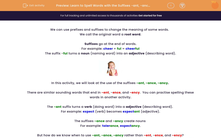We can use prefixes and suffixes to change the meaning of some words.
We call the original word a root word.
Suffixes go at the end of words.
For example: cheer + ful = cheerful
The suffix -ful turns a noun (naming word) into an adjective (describing word).

In this activity, we will look at the use of the suffixes -ant, -ance, -ancy.
There are similar sounding words that end in -ent, -ence, and -ency. You can practise spelling these words in another activity.
The -ant suffix turns a verb (doing word) into a adjective (describing word).
For example: expect (verb) becomes expectant (adjective).
The suffixes -ance and -ancy create nouns
For example: tolerance, expectancy.
But how do we know when to use -ant, -ance, -ancy rather than -ent, -ence, and -ency?
If a word has a word in the same family that ends in -ation, that usually means that it uses -ant, -ance, -ancy.
For example hesitant and hesitation.
However, there are many words which don't follow these rules and just have to be learnt!
Try writing the word down both ways and seeing which looks right. The more you read, the better you will become at this!

Here are some examples of words that use these suffixes that we will practise in this activity:
observant
hesitant
hesitancy
substance
expectant
And the exceptions:
assistant
assistance
You can listen to them here:
You can break the words up into the root and suffix to help you to spell them
observ ant
hesit ant
hesit ancy
subst ance
expect ant
assist ant
assist ance
Use Look, Say, Cover, Write, Check to practise spellings a few times before we begin the activities.
.jpg)








